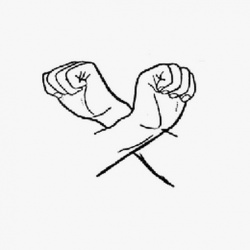Difference between revisions of "Vajrahūmkāra Mudrā"
(Created page with "thumb|250px| <poem> Strength Gesture Saunders p. 114 Vajrahūmkāra Mudrā or Basara Mudrā zhuànyuē luóhōng jīngāng yìn 䌸曰...") |
|||
| Line 1: | Line 1: | ||
[[File:VajrahumkaraMudra.JPG|thumb|250px|]] | [[File:VajrahumkaraMudra.JPG|thumb|250px|]] | ||
| + | |||
| + | |||
| + | |||
<poem> | <poem> | ||
Strength Gesture | Strength Gesture | ||
| − | Saunders p. 114 Vajrahūmkāra Mudrā or Basara Mudrā | + | |
| − | zhuànyuē luóhōng jīngāng yìn 䌸曰罗吽金钢印 縳曰羅吽金鋼印 | + | Saunders p. 114 [[Vajrahūmkāra Mudrā]] or [[Basara Mudrā]] |
| − | This gesture, sometimes called the | + | [[zhuànyuē luóhōng jīngāng yìn]] [[䌸曰罗吽金钢印 縳曰羅吽金鋼印]] |
| − | Sometimes the right hand holds a vajra or stylized thunderbolt (symbolizing a method or path [or for that matter a thunderbolt or the male principle] and the left a ghaṇṭā or bell (symbolizing purpose or wisdom (or the female principle), although these objects may be left to the imagination. The two together are taken to mean path and purpose, here united. The gesture represents diamond-like strength and even great anger (!) in the cause of conquering error and illusion. | + | |
| + | This gesture, sometimes called the “[[diamond mudrā]],” is made by closing both hands into fists (with the thumbs inside) and crossing the wrists in front of the {{Wiki|chest}}. Although there are variants, usually the palm side of the wrist faces away from the [[body]], and the right arm is closer to the {{Wiki|chest}} than the left arm. (Sometimes the palms face in and the left arm is closer to the {{Wiki|chest}}.) | ||
| + | |||
| + | Sometimes the right hand holds a [[vajra]] or stylized [[thunderbolt]] ([[symbolizing]] a method or [[path]] [or for that {{Wiki|matter}} a [[thunderbolt]] or the {{Wiki|male}} [[principle]]] and the left a [[ghaṇṭā]] or [[bell]] ([[symbolizing]] {{Wiki|purpose}} or [[wisdom]] (or the {{Wiki|female}} [[principle]]), although these [[objects]] may be left to the [[imagination]]. The two together are taken to mean [[path]] and {{Wiki|purpose}}, here united. The gesture represents diamond-like strength and even great [[anger]] (!) in the [[cause]] of conquering error and [[illusion]]. | ||
</poem> | </poem> | ||
[http://anthro.ucsd.edu/~dkjordan/chin/shoouyinn/MudrasDescribed.html anthro.ucsd.edu] | [http://anthro.ucsd.edu/~dkjordan/chin/shoouyinn/MudrasDescribed.html anthro.ucsd.edu] | ||
[[Category:Buddhist Terms]] | [[Category:Buddhist Terms]] | ||
[[Category:Mudra's]] | [[Category:Mudra's]] | ||
Revision as of 23:51, 5 January 2016
Strength Gesture
Saunders p. 114 Vajrahūmkāra Mudrā or Basara Mudrā
zhuànyuē luóhōng jīngāng yìn 䌸曰罗吽金钢印 縳曰羅吽金鋼印
This gesture, sometimes called the “diamond mudrā,” is made by closing both hands into fists (with the thumbs inside) and crossing the wrists in front of the chest. Although there are variants, usually the palm side of the wrist faces away from the body, and the right arm is closer to the chest than the left arm. (Sometimes the palms face in and the left arm is closer to the chest.)
Sometimes the right hand holds a vajra or stylized thunderbolt (symbolizing a method or path [or for that matter a thunderbolt or the male principle] and the left a ghaṇṭā or bell (symbolizing purpose or wisdom (or the female principle), although these objects may be left to the imagination. The two together are taken to mean path and purpose, here united. The gesture represents diamond-like strength and even great anger (!) in the cause of conquering error and illusion.
